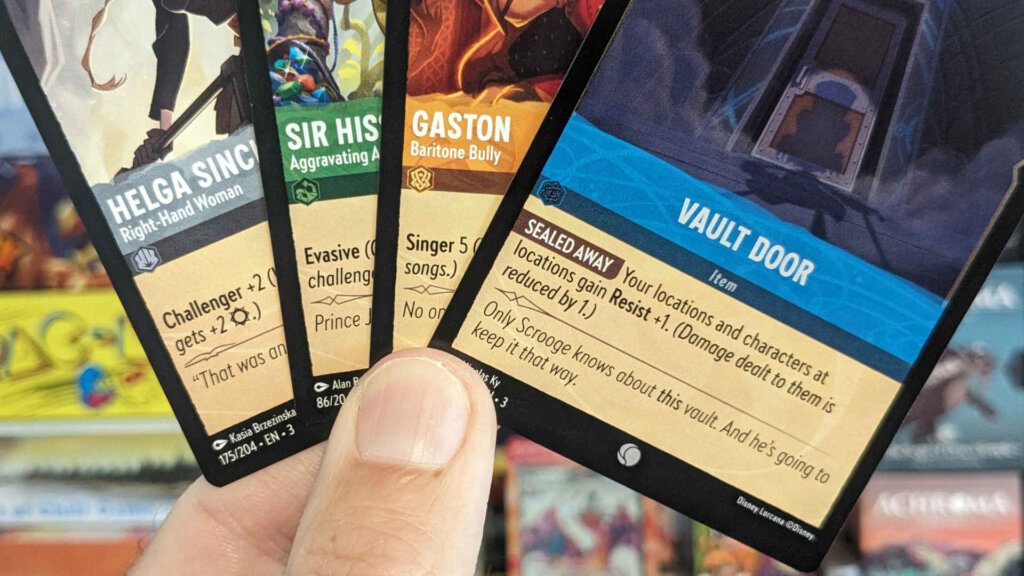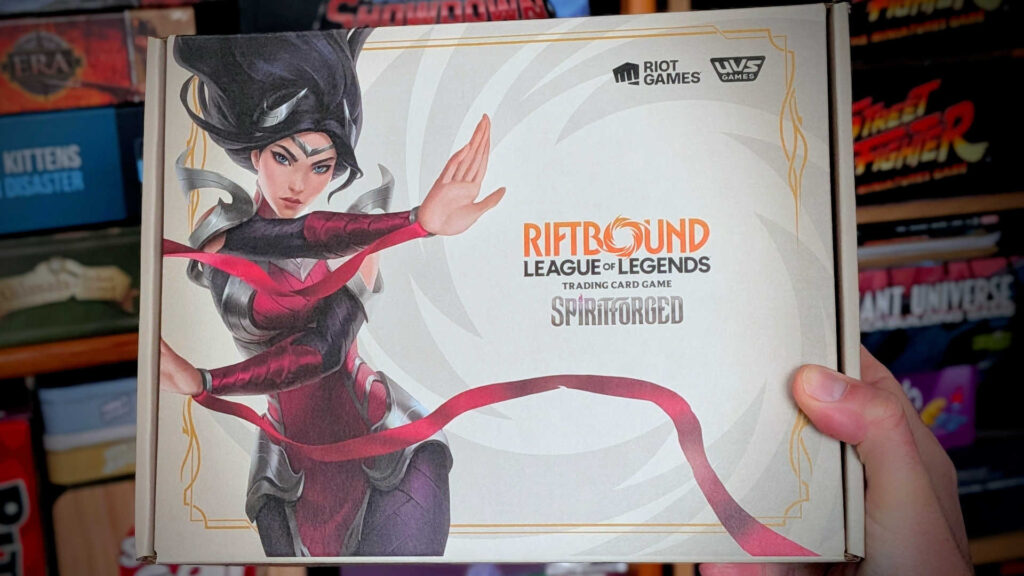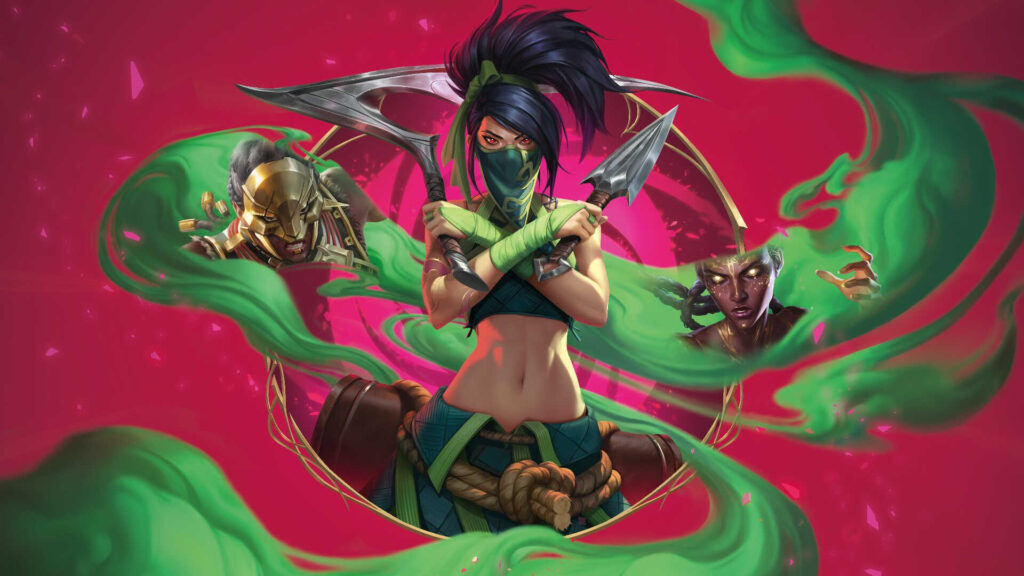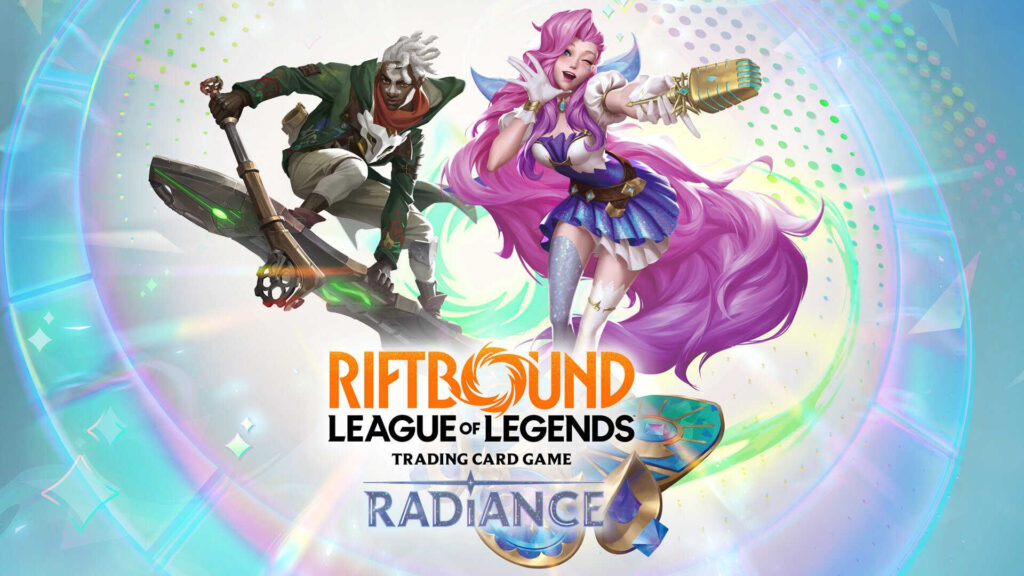Almost all CCGS and TCGs (Collectible Card Games and Trading Card Games; basically terms meaning the same thing) feature selected words on cards which are shorthand for specific abilities.
Of course, being the first CCG, Magic: The Gathering (or MTG) pioneered this, with keywords on cards such as First Strike, Flying, Reach and Vigilance, among countless more. In fact, with MTG having been around for more than three decades, the list of keywords featured in the game is absolutely huge, and quite often keywords may pop up that players have to look up the meaning of, which negates the purpose of simplifying a card’s text a little (though it’s unlikely that, once referenced, a player will have to check a specific keyword’s meaning again).
Disney Lorcana is no different in terms of the verbal shorthand it uses, with several keywords having been introduced in The First Chapter, and a few more steadily, rather than overwhelmingly, being added in subsequent sets.
Even though they’re fairly manageable at the moment, in the heat of the moment it can still be worth having a quick refresher to make sure that you understand exactly what each keyword means and what makes it useful in-game. So let’s go through each of them one by one, in alphabetical order; come with us as we take a look at all of the keywords in Disney Lorcana!
Table of Contents
Toggle1. Bodyguard
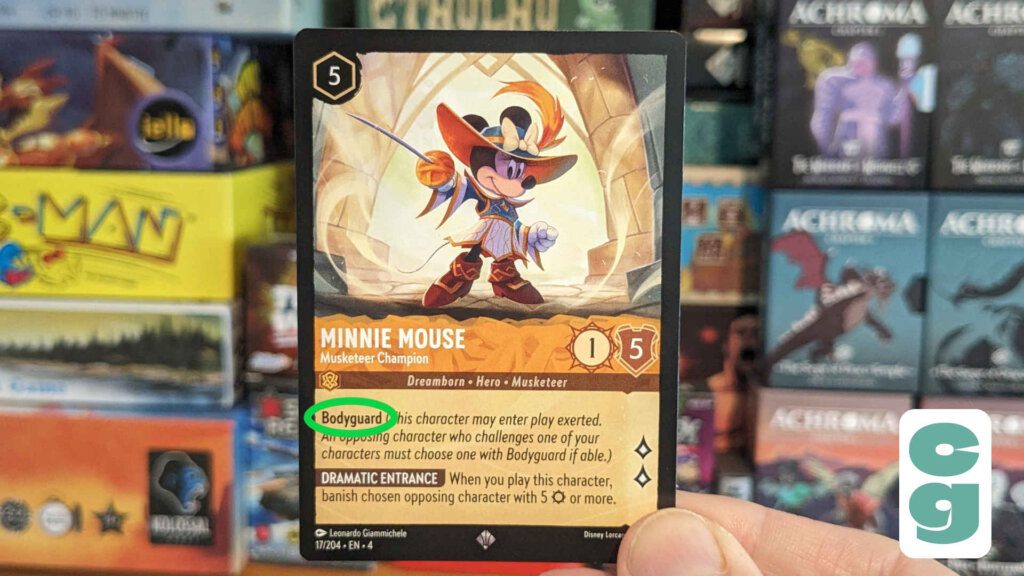
The explanatory text accompanying Bodyguard (the keyword itself is circled in green above) reads as follows: ‘This character may enter play exerted. An opposing character who challenges one of your characters must choose one with Bodyguard if able.’
When you play a character from your hand in Disney Lorcana in the ‘normal’ way (i.e. without using another card’s ability or keyword), you’ll pay its Ink cost and then place it in your play area, in the ready position (vertically aligned). You can’t use it until your next turn, because in Lorcana, each character is paid for using ‘Ink’, and this takes a turn to dry before the character can be used in any way, except in certain situations or, as you’ll see later, with another keyword.
As it enters play in the ready position, it’s not normally at risk of being the target of a challenge by another player. That’s because, when challenging, players may only target characters who are exerted, which means they’re aligned in the horizontal position. Characters exert when they challenge, quest or use certain abilities, but if they have Bodyguard as a keyword, they can enter play Exerted. Why would you want to do this?
Well, characters with Bodyguard will usually be there to divert challenges from being directed at other characters. Not only can they be the target of challenges, but they must be, unless another character with Bodyguard is chosen, or another effect prevents it.
These characters will usually have higher than normal Willpower, which is Lorcana’s term for a character’s health, in order to be able to soak up at least a few challenges before being removed from play.
2. Challenger +X
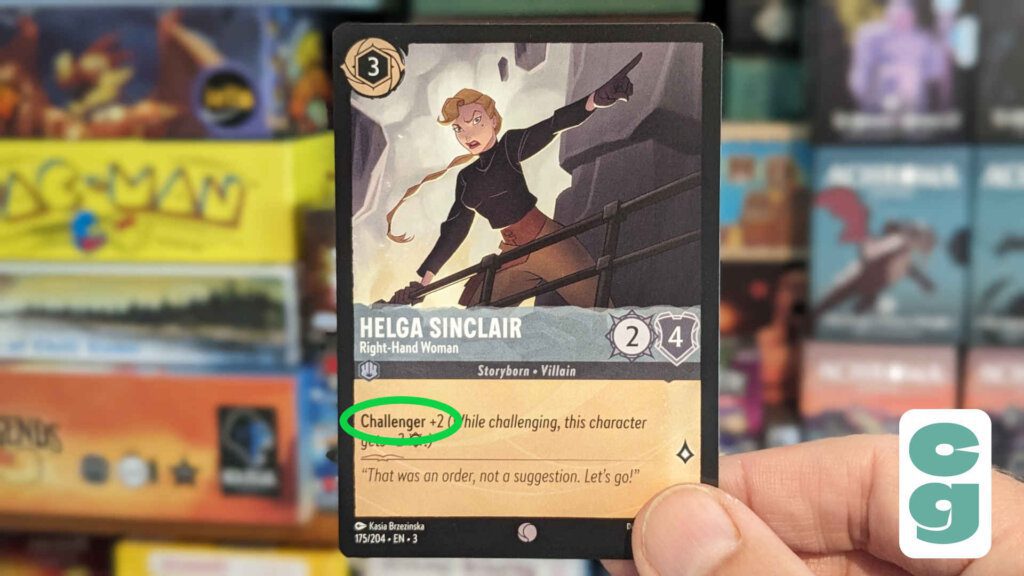
The Challenger keyword’s text states: ‘While challenging, this character gets +X strength’. Note that the word ‘strength’ doesn’t appear; instead, the strength symbol is used, and of course the X will be a number. So what does this mean in general?
This is a fairly straightforward keyword, even for novice Lorcana players. Any time a character with the Challenger keyword (circled above in green) challenges another character, the Challenger gets a bonus to their strength value, equal to the X in the description. The bonus doesn’t apply if this character is being challenged, or in any other situation; only when they’re actively chosen to challenge another character themselves. Note also that the bonus doesn’t remain, it’s removed once the character’s challenge ends, but will apply again if or when they next challenge.
It gives a player more incentive to be proactive and somewhat aggressive with a character who has Challenger, given that they’ll be stronger when they actively take on other characters!
3. Evasive
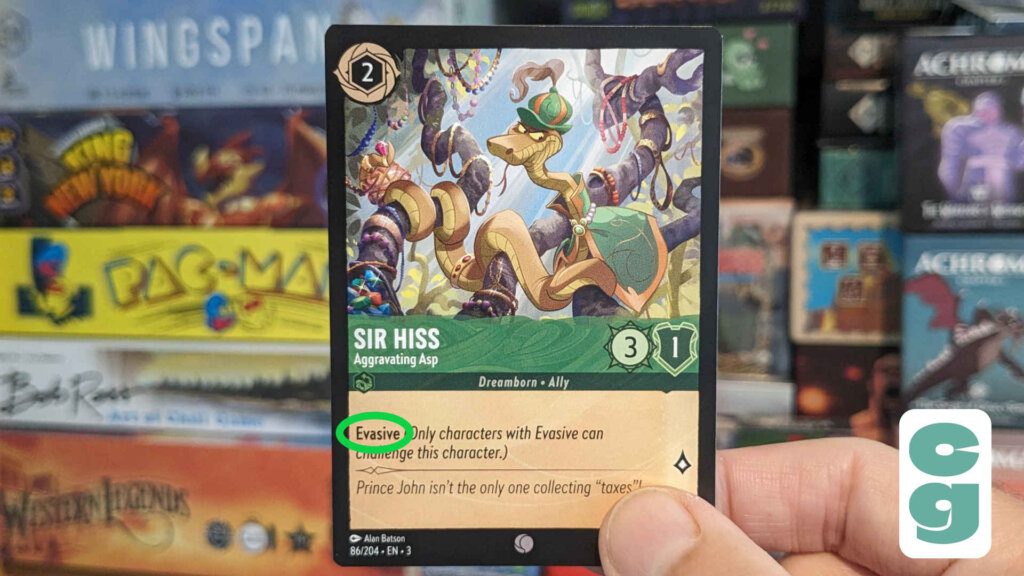
Another very simple keyword (which is, again, circled in green in the image above), the Evasive keyword text is: ‘Only characters with Evasive can challenge this character’.
What that means is exactly what it says: that you can only challenge a character who has Evasive, if the character you’re using has Evasive itself. Of course, characters who have Evasive can challenge any character they choose, and may otherwise quest, challenge or use different abilities as normal!
Characters with Evasive can still be targeted by other card abilities, with their only restriction being that they can’t be challenged by another character unless it has the Evasive keyword.
4. Reckless
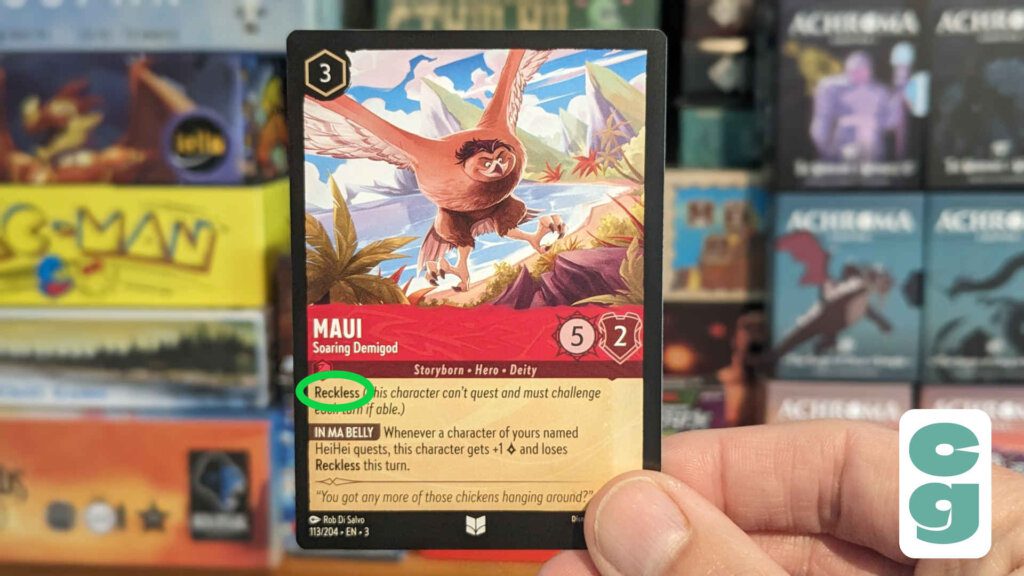
Though Challenger encourages players to be more aggressive, Reckless is a keyword that makes it nigh on compulsory! The Reckless keyword text is as follows: ‘Characters with Reckless can‘t quest and must challenge if able’.
So no questing, though you’re very unlikely to have a card which has Reckless as well as Lore symbols. Of course there’s a possibility that other card effects or abilities could grant a Reckless card with Lore points, but they wouldn’t be able to use questing in order to gather them.
Also, a Reckless card doesn’t hold back and must challenge during your turn; of course, the text also states ‘if able’. If your opponent doesn’t have any exerted characters, or has no characters at all, then the Reckless card can’t challenge.
It’s worth noting that you don’t have to use Reckless immediately when it’s your turn; you’re still able to choose the timing of when the challenge takes place, as long as you do challenge with a Reckless character at some point during your turn.
5. Resist +X
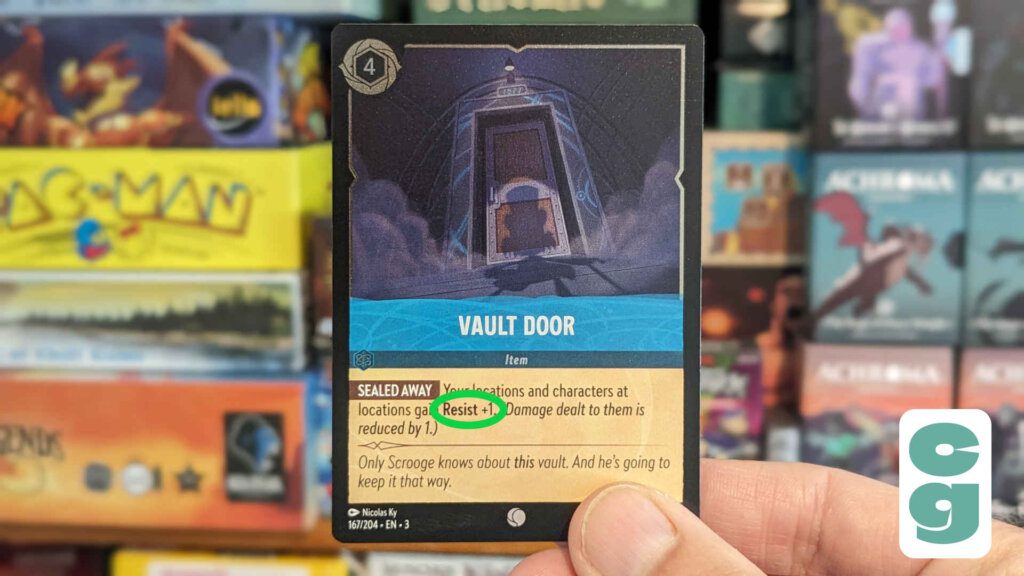
Characters with Resist (or cards which can give Resist to characters, as shown above) are able to reduce the Willpower damage they take, by X number of points. The keyword’s text is: ‘Damage dealt to this character is reduced by X’.
Note that this applies any and every time the character is being dealt damage. If a character with Resist +2 is challenged, they reduce the damage they take from the challenging character by 2. Then, assuming they survive, if the character with Resist +2 is then supposed to be dealt 2 damage by another card’s effect, that card effect’s damage would be reduced to zero, as their Resist would apply in both instances. It doesn’t get ‘used up’ once per turn!
Introduced in Rise of the Floodborn, Resist can also stack, meaning that you can have multiple instances of Resist on a character in the right circumstances, and they all add together. With the right cards, you can even ‘give’ the Resist keyword to a character who doesn’t have it printed on their card; this can, of course, happen with other keywords too.
6. Rush
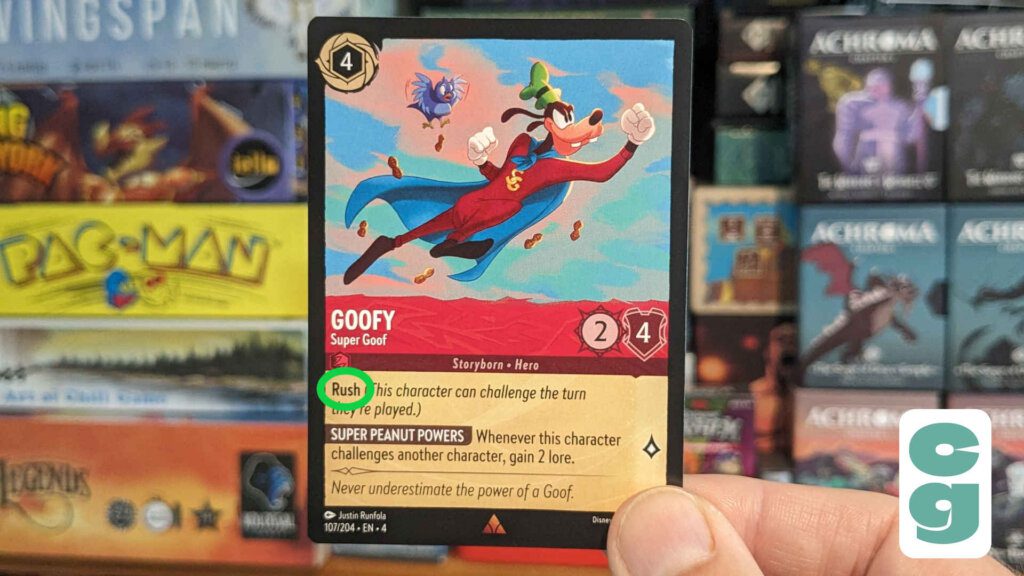
Remember we said that cards need a turn for their Ink to dry before they can be used? Well, characters with Rush have no such restriction!
The Rush keyword text reads as follows: ‘This character can challenge the turn they’re played’. Note that some cards may give the Rush keyword to a character, which will then allow them to challenge on the turn they’re played.
As with all cards, in any TCG, it’s all about timing as to when it’s best to play a card that has a keyword, so use Rush when you’ve got a good chance to immediately challenge another character!
7. Shift X
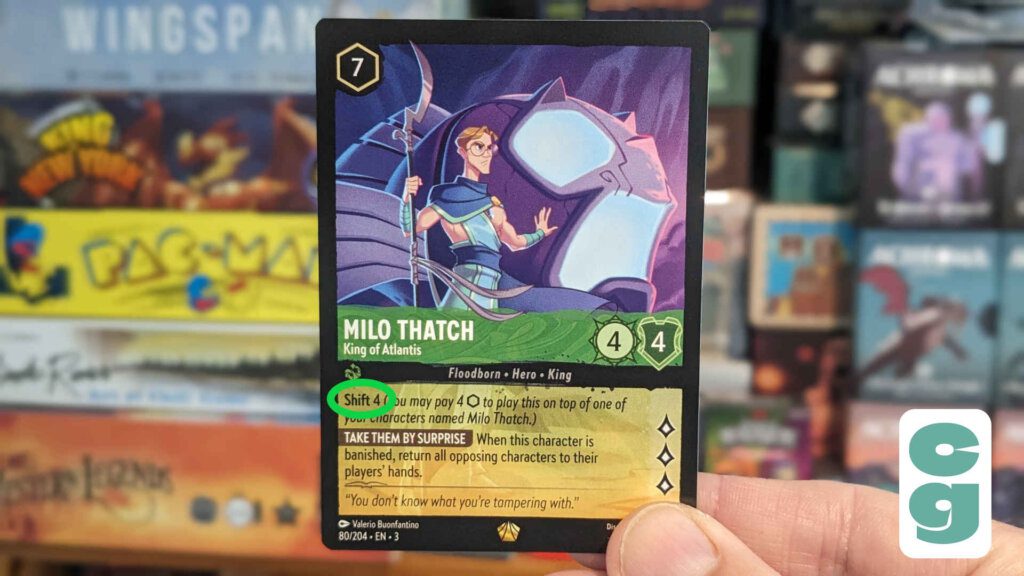
I always explain and liken the Shift keyword to being essentially the same thing, in many ways, as evolving a Pokémon. In the Pokémon TCG, you’ll place a Stage 1 card on top of a Basic Pokémon to evolve it into a new form, or a Stage 1 onto a Stage 2 for the same effect. The card below the newly placed, evolved form of the Pokémon is ignored and only the abilities, attacks, health and other stats on the visible card are then taken into account, though damage is carried over to the new form.
In Lorcana, a Shift card is placed on top of a card which has the same card name, in order to play the Shift card for a reduced cost (Shift 4 is circled in green in the above image). This technically ‘evolves’ the character into a more powerful version, but allows you to do so for less Ink. The Shift keyword text reads: ‘You may pay X Ink to play this on top of one of your characters named Y’, with x being the Ink cost and Y being the character’s name.
Also, as long as the character you Shift from was played a turn before, you can also use the more powerful character immediately. If, however, you played the lesser, un-Shifted character on the same turn and then played the Shift character on top of it, the Ink would still not be dry and it could not challenge that turn.
Still with us? Then do also note that any damage, bonuses or penalties do carry over to the new, Shifted character too; whatever statuses the original character had are ‘inherited’ by the new one.
8. Singer X
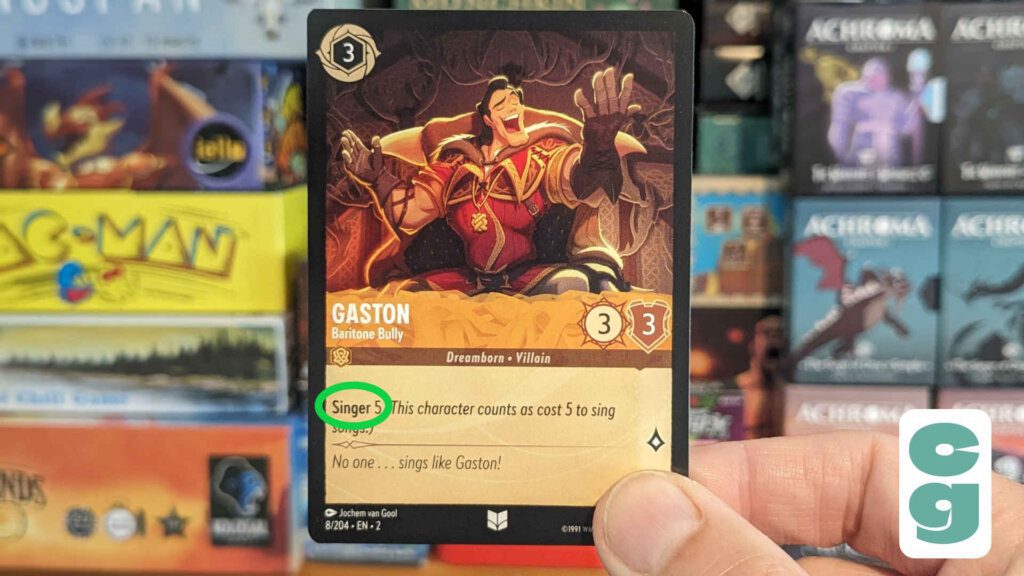
With X being the Ink cost, the Singer keyword (Singer 5 is circled above) text states: ‘This character counts as cost X to sing songs’. Songs are powerful action cards that characters of a certain level can play for free (in Lorcana terminology, when a character ‘sings a song’, this means to play the song card using a specific character); when a card has Singer, it allows them to play more powerful songs for free than their Ink cost would otherwise be able to.
Note that their Ink cost doesn’t change or count as the higher amount for any other card effect or ability in the game; it applies only when using the character to sing a song for free!
9. Sing Together X
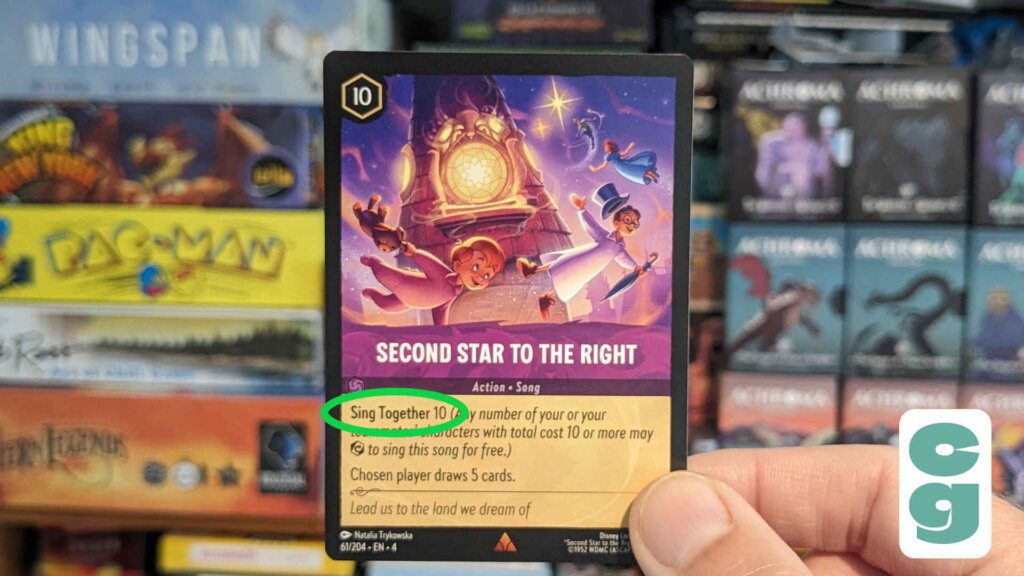
Debuting in the Illumineer’s Quest: Deep Trouble set, Sing Together is a keyword that was introduced in order to allow players to work together, to bring more powerful Songs into play than they would otherwise be able to.
So, the keyword text says: ‘Any number of your or your teammates’ characters with total cost x or more may exert to sing this song for free.’ So you can use multiple characters of your own, or have the players on your side also assist you with singing a particular song that has ‘Sing Together X’, with X being the total Ink cost of all characters who exert. As you can see from the card above, we’ve circled Sing Together 10, which means it needs a combined character Ink cost of 10 to play!
10. Support
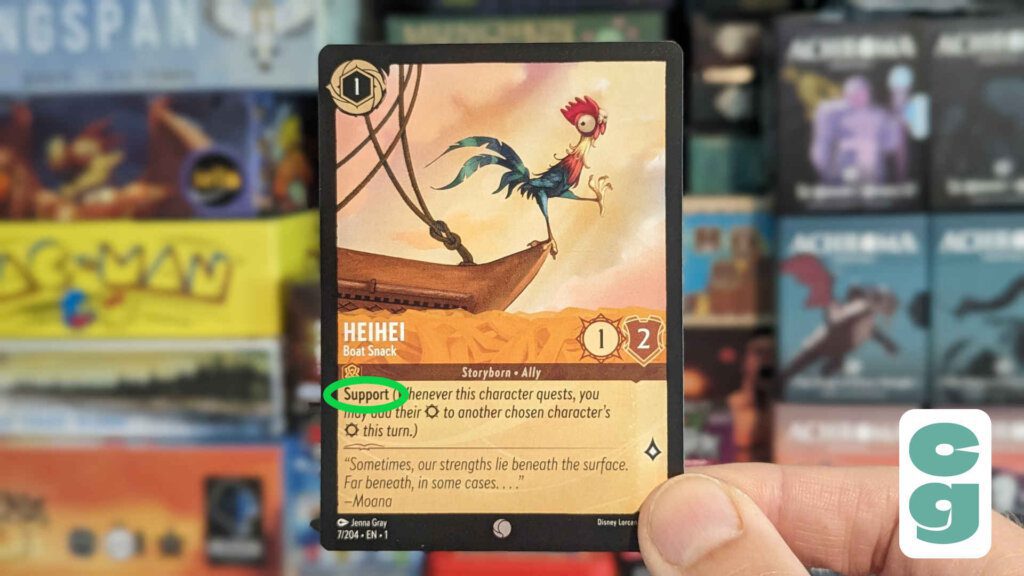
The keyword text for Support is as follows: ‘Whenever this character quests, you may add their strength to another chosen character‘s strength this turn.’ So, to break that down: the character with Support must quest, and if they do, they can then add their Strength to another character you have in play, but only for that turn.
The Support character doesn’t lose or ‘use up’ their Strength; it’s just that their value is added to another’s for that specific turn, usually when the second character is challenging. This gives them a better chance of taking out a stronger opposing character; even if the challenging character is banished themselves, the character with Support isn’t involved in the challenge, so won’t be affected by the outcome.
11. Vanish
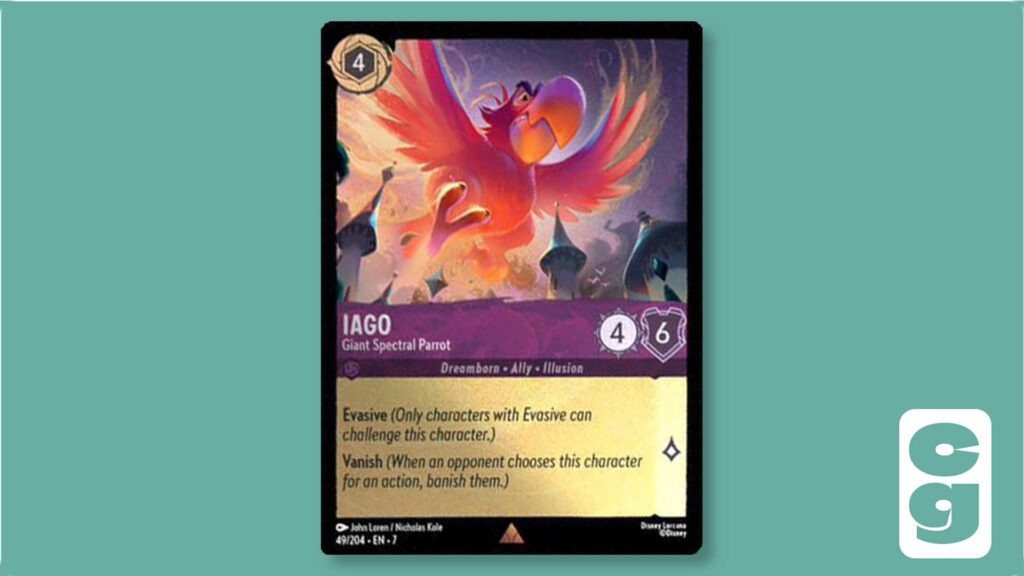
A keyword so new that it hasn’t been officially discussed by Ravensburger, Vanish debuts in Disney Lorcana’s seventh set, Archazia’s Island. A character with Vanish will banish any card which chooses them as the specific target of an action, so for example if they’re chosen when applying the effect of an Action type card, not when they’re challenged or otherwise involved in an effect which doesn’t hit a specific target, but instead affects multiple cards.
Banishing a card means removing it from play and placing it in its owner’s discard pile, so players will need to think carefully about whether targeting a character with Vanish is worth the trade off. We’ll have more details on this keyword as soon as Ravensburger reveal further information on Archazia’s Island!
12. Ward
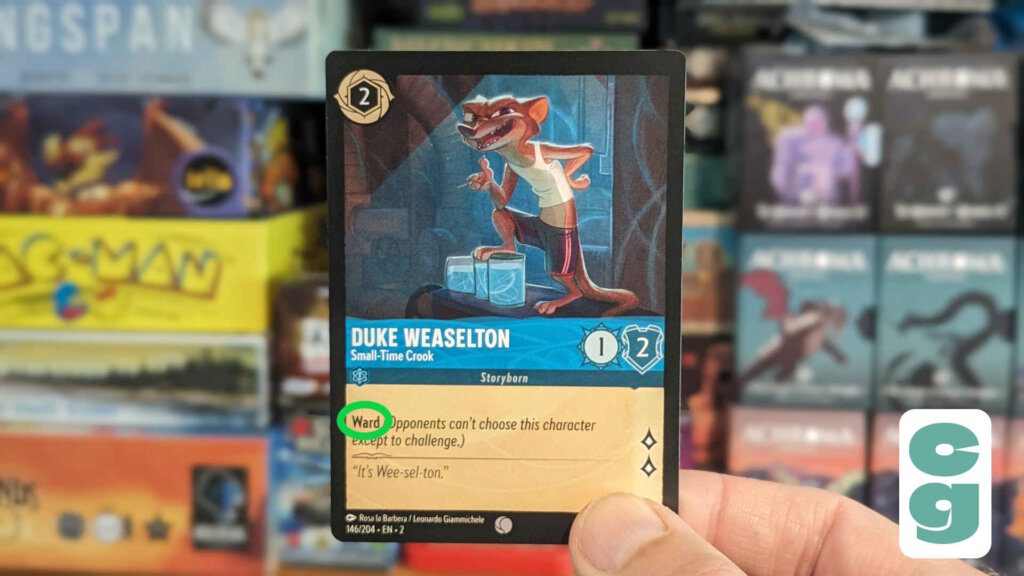
There’s lots of other ways beyond being involved in challenges that a character is at risk from being damaged or banished, but that’s where Ward comes in.
The Ward keyword reads: ‘Opponents can’t choose this character except to challenge’. This means that, when playing an action or card ability that allows a player to choose a character to damage, banish or affect in any way, if a character has Ward they can’t be targeted.
It’s definitely worth noting that characters can still challenge, be challenged, quest and use any other abilities or card effects their owner chooses, but they cannot be chosen by their opponent as the target of anything other than a challenge.
Are There Any More Keywords in Disney Lorcana?
With the aforementioned Archazia’s Island on the way, it may bring another keyword to Lorcana in addition to Vanish, but as of yet we’ve seen no further keywords, even going as far forward as the sets beyond Archazia’s Island, which we know to be Reign of Jafar and Fabled. We will update this guide with more keywords as and when further information is released, however, so watch this space!
You can check out each set for Disney Lorcana in our full list, and if you want a look at how to play one of Lorcana’s most innovative modes, take a look at how to play solo and co-op in Disney Lorcana!


